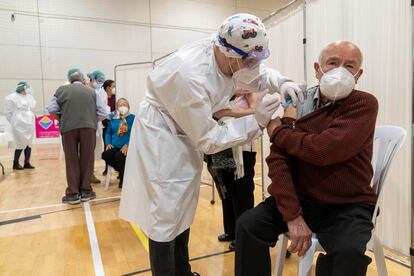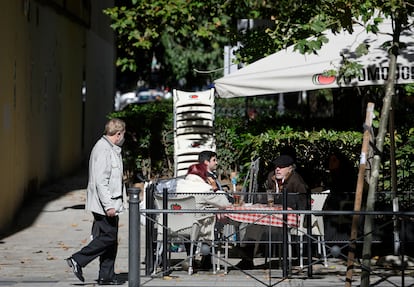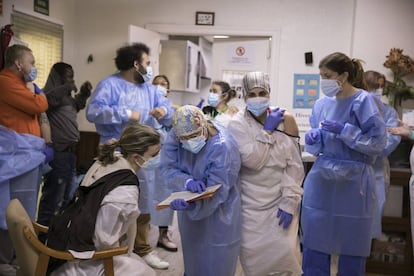Spain announces new target groups for coronavirus vaccination
The 60-to-79 bracket is next in line, as well as under-60s with medical conditions. In Catalonia, health officials have detected the first cases of the strain first reported in Brazil


Spanish health officials on Wednesday defined new priority groups for the coronavirus vaccine.
Shortly after several regions began inoculating the 80-and-over population, the public health committee of the National Healthcare System said that next in line for the Moderna and Pfizer vaccines are people between 70 and 79 years of age, who will in turn be followed by the 60-to-69 age bracket.
This expert committee also decided that the AstraZeneca vaccine, which is being administered to around 5.1 million essential workers (such as teachers and police officers) under 55 years of age, will next target the general population between 45 and 54, as well as any under-60s with pre-existing health conditions that make them especially vulnerable to Covid-19. These medical conditions have not yet been defined, however.
What is also unclear is exactly when these new priority groups will get their shots, as this depends on the size of the shipments and the speed of administration in a healthcare system whose resources are already stretched thin.
Different regions of Spain are proceeding at different speeds. For now, seven have begun immunizing the 80-and-over population, while most are still working on the Phase 1 priority groups: residents and workers of care facilities, health personnel and people with need for daily assistance who do not live in a care home. Meanwhile, essential workers under 55 are also getting immunized with the Oxford-AstraZeneca vaccine.
Although no specific timelines have been announced, the goal is to vaccinate 80% of seniors 80 and over before the end of March, which means administering two doses to around 2.8 million people. But other groups will likely start getting their first jabs before that process ends, to ensure that there are no breaks in the pace of vaccination.
Once Spain’s seniors have been immunized, it is hoped that the epidemiological data will change significantly. Right now, eight out of every 10 deaths from Covid-19 are occurring among the elderly. Even if the virus remains in circulation the way it has to date, deaths should decline noticeably.
Madrid: outbreaks in social settings

Social gatherings, the workplace, care facilities, the family home and schools are, in that order, the biggest source of outbreaks in the Madrid region, according to new regional government figures that show, for the first time, a breakdown of the origin of outbreaks.
There have been 1,340 outbreaks outside household settings since the first week of July, causing 12,776 infections. Another 236 outbreaks inside households have led to 1,089 infections. But these infections represent just 2.8% of the 482,768 that have been diagnosed since June 29.
The Madrid regional government’s official line, reiterated often since the summer, has been that “most [of the outbreaks] are occuring in family settings.” Although authorities never produced data to back up that claim, this theory is behind the looser restrictions adopted by Madrid since the beginning of the second wave in late July. On Thursday of this week, the region is planning to expand bar and restaurant opening hours even further, and push the curfew back an hour.
“The largest share of infections remains unspecified,” said the epidemiologist Fernando García, of the Madrid Public Health Association, alluding to the government report. Where did the remaining 469,992 cases not associated with an outbreak take place? This expert says that traceability should be done in all cases, yet in Madrid last week the traceability rate was just over 15%, according to weekly data sent to the Health Ministry.
The most recent numbers show that the vast majority of identified outbreaks are taking place outside the home. But even this is not statistically representative because the sample is so small that it cannot be extrapolated, notes García. “What is happening in reality, we don’t know. We are in a situation of vagueness.”
Catalonia detects P.1 strain

The Catalan government on Wednesday announced that it has detected two cases of the P.1 coronavirus strain first reported in Brazil. Both were identified in members of a family of six people, said the Catalan public health chief, Josep Maria Argimon. The final lab results confirming the cases will be available on Friday.
This is the first time that the new variant has been found in Catalonia. Cases were first detected in Madrid two weeks ago. Argimon said that this strain is more infectious that the original coronavirus but “does not seem to be more serious,” and that “it might make vaccines less efficient, but we don’t have evidence of it.”
Meanwhile, the strain first detected in the UK continues to make headway in Catalonia. Argimon said that the B.1.1.7 variant was responsible for a third of detected cases, and that in some parts of the northeastern region it represents 40% of cases. “There are some areas with hardly any [cases of] the British variant. But if we once thought it would be the dominant strain by mid-March, now we have reason to suspect that it will be sooner than that.”
With reporting by Pablo Linde, Isabel Valdés and Bernat Coll.
English version by Susana Urra.
Tu suscripción se está usando en otro dispositivo
¿Quieres añadir otro usuario a tu suscripción?
Si continúas leyendo en este dispositivo, no se podrá leer en el otro.
FlechaTu suscripción se está usando en otro dispositivo y solo puedes acceder a EL PAÍS desde un dispositivo a la vez.
Si quieres compartir tu cuenta, cambia tu suscripción a la modalidad Premium, así podrás añadir otro usuario. Cada uno accederá con su propia cuenta de email, lo que os permitirá personalizar vuestra experiencia en EL PAÍS.
¿Tienes una suscripción de empresa? Accede aquí para contratar más cuentas.
En el caso de no saber quién está usando tu cuenta, te recomendamos cambiar tu contraseña aquí.
Si decides continuar compartiendo tu cuenta, este mensaje se mostrará en tu dispositivo y en el de la otra persona que está usando tu cuenta de forma indefinida, afectando a tu experiencia de lectura. Puedes consultar aquí los términos y condiciones de la suscripción digital.








































